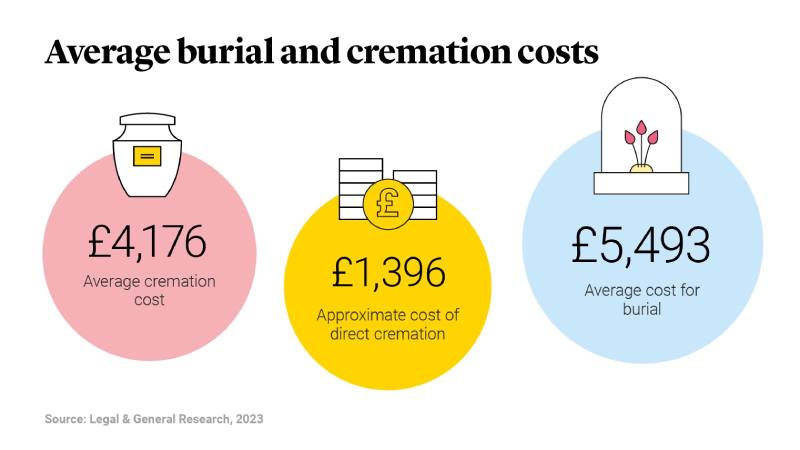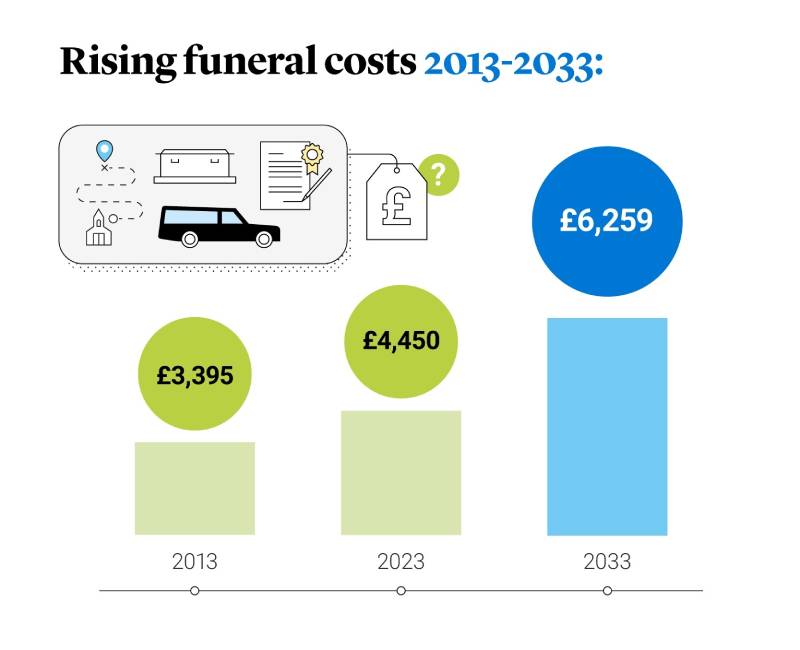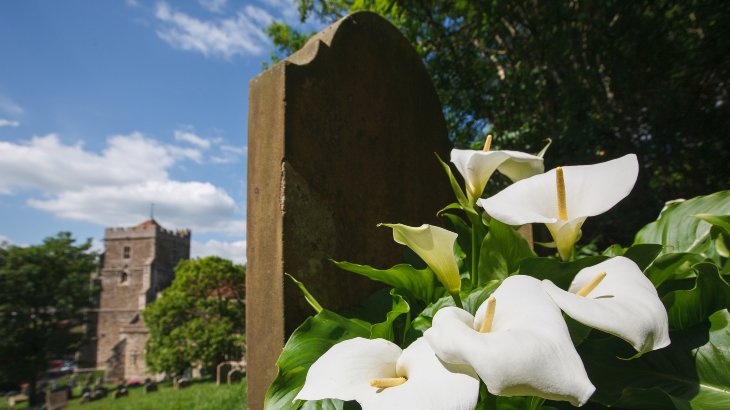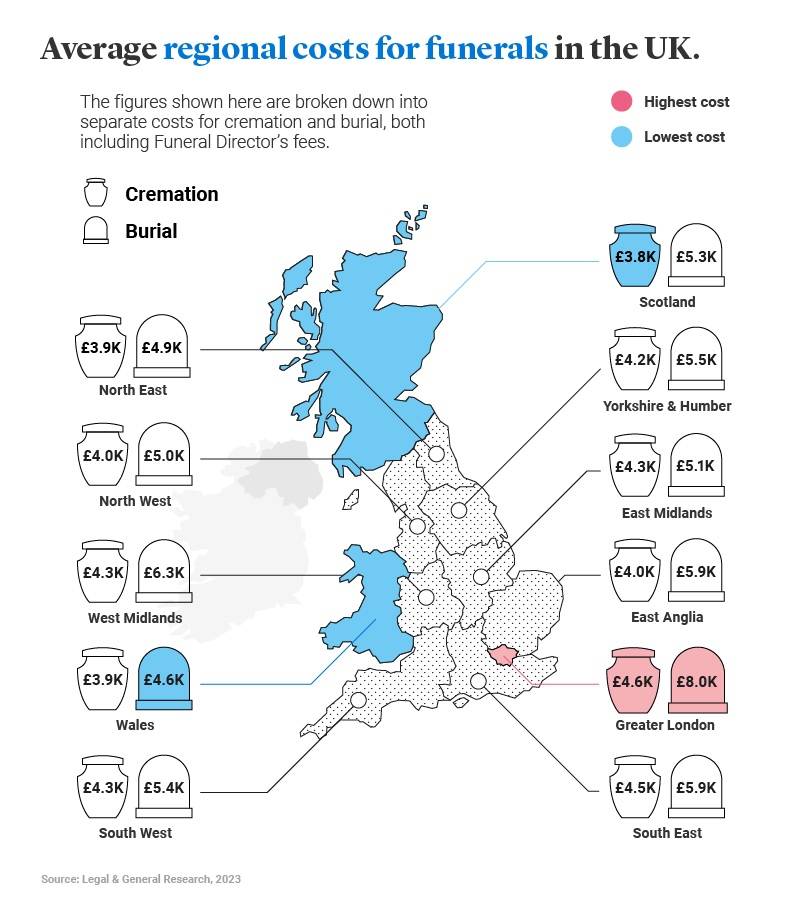Funeral costs in the UK
Planning a funeral isn't something anyone looks forward to, but to make your life easier, we've put together a guide based on research to help you calculate funeral costs in your area.
How much does a funeral cost?
The average cost for a funeral in the UK in 2023 was £4,450. This figure is an average of both cremation and burial costs, but more specifically, the average cost of cremation in 2023 was £4,176, and for burials it was £5,493.

The 'cost of dying' is on the increase
As you can see from the diagram here, UK funeral costs have been on an upward trend for some time, and look set to continue to rise.
If funeral fees keep rising at the current rate, the cost of a funeral could be £6,259 by 20332 - an increase of more then 40% compared to 2023.

Is the cost of living crisis affecting funeral prices?
Many households have been feeling the pinch, and the Consumer Prices Index (CPI) measurement for August 2023 showed that consumer prices were 6.7% higher than a year before.
But while households may have less disposable income, that doesn’t mean funeral costs will be any cheaper. In response to the cost of living crisis, some local authorities, such as Hyndburn in East Lancashire, have opted to freeze funeral costs for local residents. As we’ll explore, there are significant regional variations in UK funeral costs.
Breakdown of funeral costs
Whilst knowing how much a funeral costs in 2023 is helpful, there are other factors that may determine how much a funeral might actually cost to arrange. That’s because the costs can depend on the type of funeral, and the level of service you require. But from the research we commissioned, here’s a breakdown of funeral costs and a summary of what exactly you get for your money.
Burial costs
In 2023, the average weighted cost of a burial funeral in the UK was £5,493. This includes the burial charges, such as the buying and opening of a plot, the minister’s fee, and funeral director charges.


Cremation costs
If you opt for a cremation funeral, you can expect to pay around £4,176. This covers the crematorium fee, minister’s fee, and funeral director’s charges, as well as doctor’s fees (not applicable in Scotland). However, the average cost of cremation alone was £937 in 2023.
Funeral director costs
Looking at funeral director charges in isolation, the average cost in 2023 was £2,953. This includes a number of elements: the transportation and care of the deceased, a limousine, a light oak or teak veneer coffin, the hearse and bearers, an opportunity for the family to view the deceased, and hygienic treatment such as embalming.

How to pay for your funeral
Even the most modest funeral is likely to cost a tidy sum, no matter where you live in the UK. Funeral prices might seem high at first, but it’s a great feeling knowing you can provide financial support for your family after you’re gone. By planning your funeral now, you could make life a little easier for your loved ones. Below, we explore some of the ways you can help meet your funeral costs - from prepaid funeral plans to Over 50s Life Insurance.
Who pays for a funeral?
The costs of a funeral normally come from the money left by the deceased (their 'estate'). However, a family member could bear the cost if they pay for a funeral and they cannot later reclaim the money from the deceased's estate. There isn't a law in the UK which states that the next of kin are responsible.
If the deceased had an Over 50s Fixed Life Insurance plan the payout could be used to contribute towards funeral costs. If the deceased had a prepaid funeral plan, in some cases the plan will cover certain aspects, but not all of the funeral. Make sure to check that everything you want is covered on any plan you take out.
Let's look in closer detail at some of these options for paying funeral costs.
Why are funeral costs so high?
Funeral costs are high largely due to the expense of appointing a funeral director, who carries out extensive professional work to conduct a funeral, as well as the third party costs for the burial or cremation; this includes the cost of the service, plus the minister or officiant. More specifically, think about the costs incurred for each element of the funeral, such as selecting a coffin, the hearse, transportation, and the hygiene methods used to embalm the deceased, all of which contributes to the overall cost.
To give you an idiea of how much your funeral might cost, the research looked at funeral costs region-by-region across the UK. As you'll see, funeral costs can vary depending on where you are in the country.

Given the wide regional variation in average funeral costs, it pays to plan ahead and consider how your loved ones might pay for your funeral. It can be daunting to think about funeral costs, but when you've spent your life taking care of your loved ones, the last thing you'd want is to leave them with financial worries.
Average UK funeral costs by region
The funeral costs shown in the table below are broken down into separate amounts for the funeral director charges only, and the total average cost of a cremation or burial funeral.
| Funeral Director charges | Cremation funeral (total) | Burial funeral (total) | |
|---|---|---|---|
| Greater London | £3,431 | £4,627 | £7,972 |
| South East | £3,232 | £4,527 | £5,878 |
| South West | £3,031 | £4,349 | £4,438 |
| East Anglia | £2,786 | £4,032 | £5,900 |
| North West | £2,836 | £4,026 | £5,012 |
| Yorkshire & Humber | £2,294 | £4,222 | £5,494 |
| North East | £2,650 | £3,874 | £4,885 |
| West Midlands | £3,053 | £4,265 | £6,262 |
| Scotland | £2,983 | £3,821 | £5,278 |
| East Midlands | £3,011 | £4,278 | £5,083 |
| Wales | £2,826 | £3,944 | £4,568 |
Cheapest burial funeral costs in the UK
Even within each region there can be high variations in funeral costs. So let’s look in closer detail at the cheapest places to arrange a burial funeral in the UK:
Deeside - £3,359
Carlisle - £3,619
Clacton on Sea - £4,110
Newcastle - £4,146
Lythm St Anns - £4,152
Cheapest UK cremation funeral costs
If you’re after a cremation funeral, here are the cheapest places according to the 2023 research:
Newcastle - £3,000
Carlisle - £3,139
Deeside - £3,180
Glasgow - £3,260
Clacton on Sea – £3,342
What are the optional funeral costs?
In addition to the cost of appointing a funeral director and the cremation or burial costs, there will be other funeral costs that depend on what kind of funeral you and your loved ones choose to arrange. Here are some optional extras:
- Floral tributes
- Memorial headstones and plaques
- Order of service sheets (if you arrange a service)
- An urn (for a cremation)
- Newspaper / online tributes or announcements
- Hiring an organist
- A dove release or other unique tributes.
Additionally, some of the more expensive optional funeral costs include purchasing a burial plot and/or opening an existing grave, or choosing a casket instead of a coffin.
What does a funeral director fee cover?
Your funeral director has an important role to play and their duties can go on far longer than you’d expect. They act as a guide in both planning and delivering the funeral, and together with their staff, will ensure all family members are cared for to make a difficult day as easy as possible.
While not all funeral directors will cover the following tasks, you can generally divide the funeral director's role into three stages:
Before the funeral
A funeral director helps with all aspects of arranging a funeral, which typically involves:
- Providing support and advice
- Collecting and preparing the deceased
- Helping to plan the service
- Arranging visits to the chapel
- Offering a choice of coffins
- Producing orders of service
- Co-ordinating floral tributes
- Completing the necessary paperwork
- Advising on a minister or officiant
- Masonry services
- Newspaper notices
- Liaising with all third parties such as the crematorium or church, minister or officiant and paying these fees on behalf of the family as well as managing all documentation.
On the day of the funeral
On the day, a funeral director ensures everything runs smoothly; for example, they will check that vehicles and pallbearers are in place, that if a funeral procession has been requested, it takes the right route and arrives precisely on time, and that a difficult day is as stress-free as possible. They’ll also be in constant contact with the crematorium and burial site staff so that those third parties know what they’re doing.
After the funeral
Once the funeral is over, they will keep in touch, often advising on the next steps regarding ashes, the collection and payment of charitable donations and the arrangement for any memorials. Also, many funeral directors provide support with probate matters.
The research found that the average cost of funeral director’s charges in 2023 was £2,953. Note, this figure refers to the funeral director fees – including one limousine plus a coffin – rather than the total cost of a cremation or burial funeral. Of course, your exact costs will depend on the choices you make, such as how many limousines you wish to hire, and the type of coffin material you want, but the figure of £2,953 is an average and takes all such decisions into account. There is also some regional variation in price; according to the research, Newcastle has the lowest average funeral director charges at £1,749, compared to £4,195 in Guildford.
Is there help available for funeral costs?
If you’re bereaved and you’re planning a funeral following the death of a loved one, you can apply for a Funeral Expenses Payment if you receive specific benefits, such as Income Support or Child Tax Credit. You will need to meet certain rules on your relationship with the deceased – for example, being a partner, close friend or relative. Find out more on GOV.UK.
While there is no cheap ‘government funeral’ as such, you may be able to apply for a public health funeral through your local authority. This is because local councils are legally responsible for funeral arrangements in cases where there isn’t enough money in the estate to pay for it, or there are no relatives or friends who can arrange the funeral. However, it’s worth bearing in mind that these funerals are primarily designed to protect public health – as per the Public Health (Control of Disease) Act 1984. The law does not dictate how councils should carry out these duties, so the decisions made by local authorities – such as whether to appoint a funeral director – will differ across the UK.
Other ways to plan a low cost funeral
If you’re ineligible for government support and simply want to plan a low cost funeral, the cheapest way is to undertake many of the tasks yourself. For example, you can collect your loved one from their place of death yourself; legally, there is no requirement for them to be embalmed.
You can potentially save on cremation costs by booking a morning slot. You could also research coffins made of bamboo, wicker and even biodegradable cardboard, though be careful, as coffin prices vary and ‘green’ coffin options are not always cheaper. You can technically arrange a funeral yourself without a funeral director, though you will be responsible for booking the crematorium, transporting the body and choosing who will lead your ceremony, if you have one. What’s more, instead of hiring caterers, your family and friends may be able to help with preparing food and drinks at a post-funeral gathering. You’ll need to pay doctors’ fees for the cremation certificate, which currently costs £164 – the fee is waived in the event of a sudden or unexpected death as the death would be referred to the Coroner.
If you wish to arrange a burial yourself, you will need to obtain a burial certificate when you register the death. If you intend to buy a new grave or re-open an existing plot, you’ll need to sign a burial plot application form through your local authority or cemetery. You may also need to hire a professional gravedigger and comply with the rules outlined by your chosen cemetery.
In all these cases, planning ahead is key, and by doing your homework you can ensure peace of mind for your family and friends at a difficult time.
What is a direct cremation?
Some people opt for a direct cremation, where the deceased is taken straight to the crematorium with no family or friends present at the time. This approach is one way to reduce cremation costs, as there is no funeral service, embalming or viewing in a chapel of rest. You also won’t have to think about transportation costs, such as the hearse and limousine, which wouldn’t be required. As well as helping you to save money on funeral costs, a direct cremation is suitable for those who wish to avoid the emotionally difficult build-up to a traditional funeral, keep things simple, and put the emphasis on remembering the departed in their own way and their own time. It’s also the case that many direct cremation providers will give you the option to pay for time in the crematorium where a small family-led service can take place.
Future funeral trends
The one thing that’s inevitable in life is that we’ll all pass away one day, but the way in which we commemorate the end of our lives is ever changing. Take a look at some emerging funeral trends.
Over 50s Fixed Life Insurance
Our Over 50s Fixed Life Insurance could allow you to leave a fixed cash sum to your loved ones that can be used to contribute towards your funeral costs, unpaid bills or even to enjoy as small a gift when you’re gone.
Find out more about Over 50s Life Insurance and how you can help contribute towards your funeral costs.

Sources:
1. This independent research was carried out Legal & General in August 2023 in association with Matter.
2. 2033 forecast based on average annual compound growth rate of 3.47% each year between 2011 and 2023.

